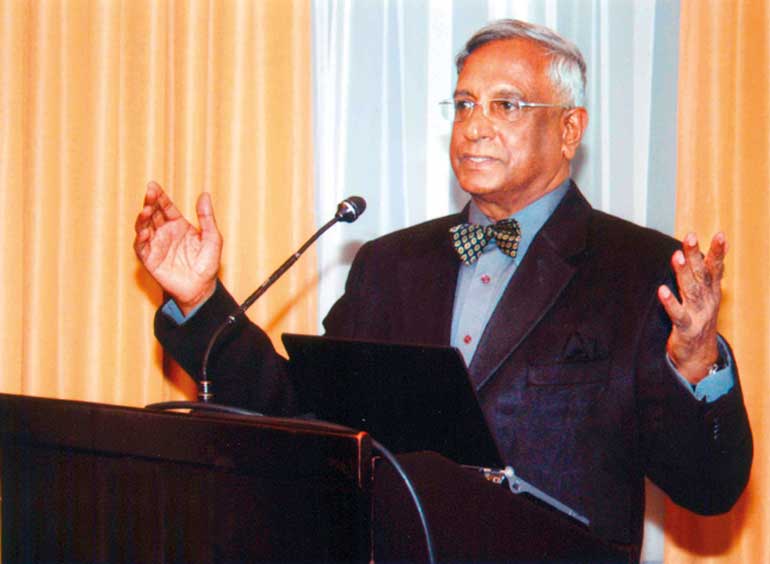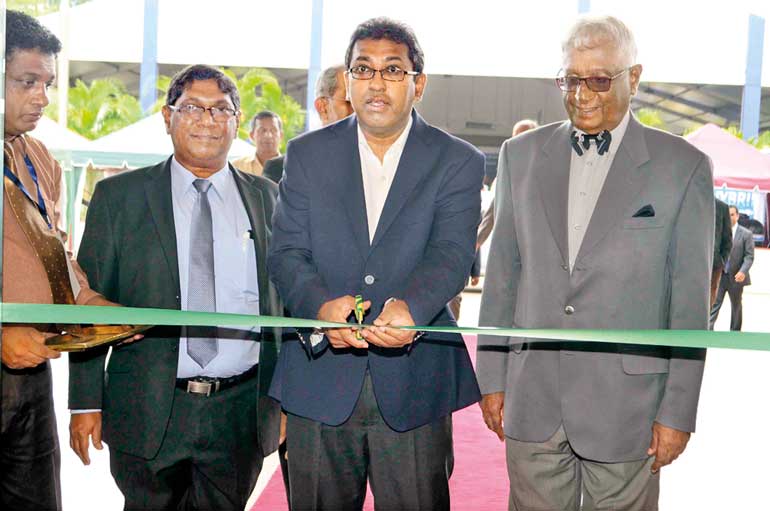Monday Feb 16, 2026
Monday Feb 16, 2026
Thursday, 26 May 2016 00:00 - - {{hitsCtrl.values.hits}}

CCI President Dr. Surath Wickramasinghe

Deputy Minister of Foreign Affairs Dr. Harsha de Silva declaring open Build SL 2016
The following issues were presented by CCI President Dr. Surath Wickramasinghe at the Build SL 2016 Inauguration, as a way forward for the construction industry to contribute towards economic growth which is the urgent need of the hour in this country.
CCI continues to highlight urgent national issues, facing the construction industry from time to time. Recently a seminar was held, under the theme ‘How to fast track the Megapolis?’ In fact, CCI sponsored two speakers from India, with experience in smart cities, to speak on planning and funding of smart cities.
During the discussions, we found two reasons that needed urgent action, one was to enact the Megapolis Authority Act, and the other was the delay in obtaining Cabinet clearance for some of the projects, submitted as per the Megapolis Master Plan. If the Cabinet could grant approval soon, we can see the construction industry moving again at a faster pace.
To facilitate the construction industry, any Foreign Direct Investor could obtain BOI approval and have their own foreign consultancy or construction company to implement their projects in Sri Lanka. In addition, the investor is free to select the local consultancy or contracting firm of their choice to work with them on a collaborative basis. There is no issue regarding this matter, from the locals.
At the Build SL 2016 Inauguration, held on 13 May, it was pointed out that the issue arises when foreign consultants visit Sri Lanka independently, on tourist visas and canvas for work for their firms, through a local agent. Some are successful and obtain locally funded projects from prestigious local developers.
These consultants do not have a recognised office or a valid work permit or pay local taxes or any other levies. Furthermore, there is no exchange of technology taking place, or any reciprocity for locals to work in their countries, overseas. Finally, the responsibility for implementation is entrusted to local consultants to obtain the UDA and other approvals, etc., and be responsible for the designs. This is unacceptable.
In addition, the local developers maintain, that the foreign consultants are cheaper, faster, and better than the local counterpart. This is questionable, since, we are aware that some foreign consultants reuse their designs with minor modifications.
The ideal scenario is for the local developer to appoint a local consultant of their choice and the local consultant in turn to obtain the appropriate services from the foreign counterpart where necessary. This way there is a collaborative legally accepted arrangement which will be to the benefit of all. This is the internationally accepted practice, which Sri Lanka should also adopt.
Another major issue facing the construction industry is the acute shortage of a skilled and unskilled workforce. For example, it has come to a situation where contractors pinch each other’s labour by offering a little more for them to switch. This practice could be avoided if employing foreign labour for major projects is permitted.
One way is for the BOI to permit contractors to recruit 100% of their labour requirements from overseas if the project is 100% FDI. In addition, there has to be a guarantee that such labour is repatriated back from Sri Lanka on completion of the project. The foreign contractor must also guarantee that, they will not employ local labour. In this context, even the Bureau of Foreign Employment could formulate a program for it to be associated with the BOI, in overseeing the functioning of the guarantee.
We are aware that, when the Port City and other projects in Colombo along with the Road Project commence shortly, the labour force, especially from the outstations, will be attracted to work on the road projects closer to their homes. Therefore, the number coming to Colombo will greatly reduce to be employed on other projects.
Accordingly, the BOI can increase the import of foreign labour for local contractors on the basis of a guarantee, as previously mentioned.
In the meantime, the Media Ministry along with the CCI could launch a campaign to change the mind-set of the youth and women with a view to attracting them to the construction industry. It could begin at school level explaining the advantages of the construction industry, which is more lucrative for them and the opportunities available for them to train in different technical disciplines. Also, advising the young regarding the value addition of their expertise, if they are to work overseas.
If the Government could discourage or give incentives for the younger generation to opt to work in the construction industry without seeking for employment, as three-wheel drivers or security guards, the work force could be increased by at least by half a million. This could reduce the need to import labour.